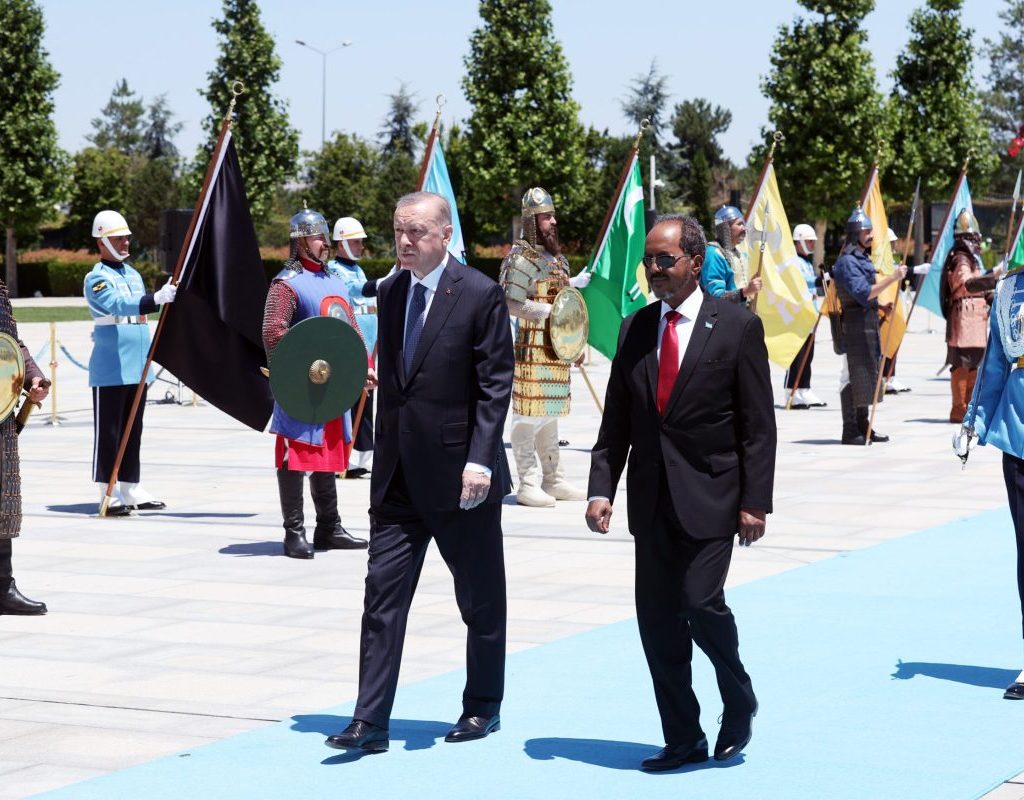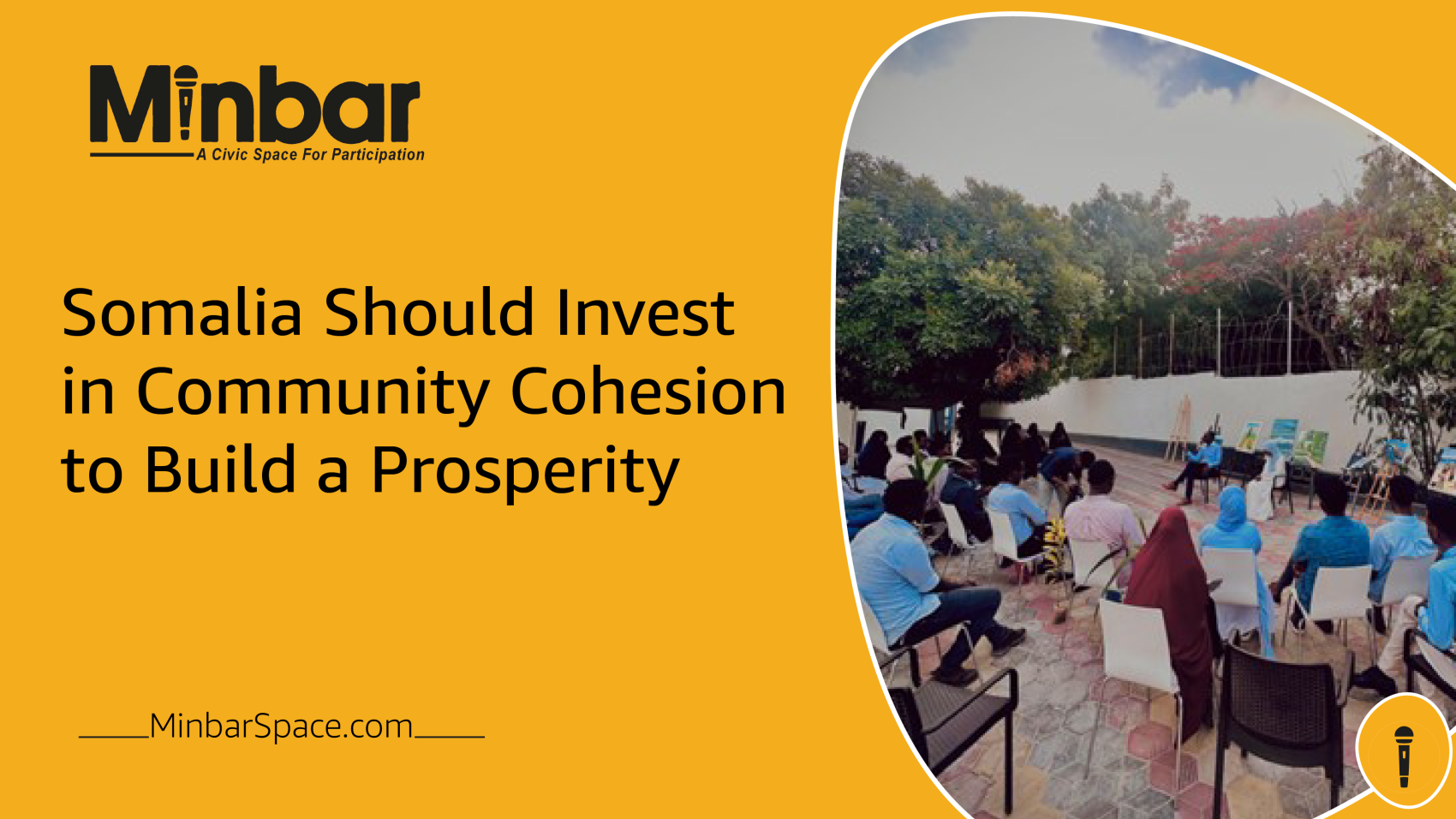
President of Türkiye, Recep Tayyip Erdogan (L) and Somali President Hassan Sheikh Mohamud (R) [Anadolu Agency].
The 12-years-old Modern relations between Somalia and Türkiye continues Diplomaticallyas the two brotherly nations take new steps in bilateral cooperation and people to people relations.
Somalia and Türkiye enjoy cordial relations, despite geographical distance brotherly nations have distinct culture and traditions based on our rich historical heritage. While diplomatic contacts go back to 16 century between the Ottoman Empire and the Somali Sultanates.
However, Somalia’s relations with Türkiye weakened when the Ottoman Empire fell apart and the Republic of Türkiyewas established in 1923. The newly founded Republic of Türkiye’s adoption of a western-oriented foreign policy, as well as the colonial powers’ separation of Somalia, were among the influences that affected the historical connection.
Later in the 1960s, Türkiye’s foreign policy started to engage with African states and pursued an open policy towards the African continent, thus, paved the way for Somalia-Türkiye relations to resume. Somalia opened its embassy in Ankara in 1976, whereas Türkiye also established its embassy in Mogadishu only after three years in 1979. Yet, this relationship did not last long as Somalia state collapsed in 1991 and the country went into a harsh civil war.
Following the fall of the Somali government in 1991 and the subsequent complex civil war, the Somali government was reconvened in 2000. The Somali government embarked on a path to normalize its affairs and restore its place in theinternational community at the United Nations. The successive governments had an enormous challenge in restoring law and order to Somalia after a protracted civil war and terrorism.
President Erdogan’s historic visit
On August 19, 2011, Turkish President Recep Tayyip Erdogan, then prime minister paid a heroic trip to Somalia. The Turkish prime minister was the first by a non-African leader to visit Somalia since the eruption of the civil conflict in 1991.
One of the worst famines in recent memory devastated Somalia and much of East Africa in 2011. The people of Somalia was severely affected by the famine due to the country’s weak state infrastructure and the imminent threat of Al-Shabaab terrorism. International humanitarian organizations and the general population were disturbed by the starvation and mortality.
The visit of president Erdogan was essential in coordinating and advancing international efforts towards helping Somalia amid the humanitarian crisis. The trip itself became an important symbol of Turkish humanitarian efforts and desire to work with underdeveloped African nations that did not possess enough governmental capacity to confront with natural and man-made calamities. The aim of Türkiye in Somalia was to provide emergency assistance to people who were affected by the drought, which was the most severe in Africa’s eastern region in 60 years.
From humanitarian assistance to development cooperation
The visit and establishment of the Turkish Embassy in the country also marked the beginning of stronger ties between Mogadishu and Ankara. These ties have expanded beyond diplomatic relations and remain apparent in other socio-economic and humanitarian areas.
In 2011, Türkiye launched its largest and effective humanitarian aid mission withe the Turkish Cooperation and Coordination Agency (TIKA), the Turkish Red Crescent (Kızlay), and civil society organizations. Since then, it has continued to provide humanitarian and development assistance in Somalia. These organizations have provided emergency response, development projects, technology transfer, and scholarships Somali students to study in Türkiye.
More foreign embassies wereopened in the country’s capital city, and the country continues to grow, drawing investment and returning Somali expatriates and diaspora communities.
Türkiye’s humanitarian assistance and emergency response to every disaster that has took place in Somalia has earned it a special position in the hearts and the minds of the Somali Nation.
Both Türkiye and Somalia emphasised the importance of shared historical and cultural links in improving bilateral relations and exploring new avenues for collaboration in other areas. Somalia became Türkiye’s key entrance to the Horn of Africa. Last August 19, 2023, marked the 12th anniversary of the resumption of relations between Türkiye and Somalia.These relationships, which have been strengthened and grown in numerous areas, are poised to deepen in the future.
Mutual high-level visits have contributed to strengthening of our ties. I was also pleased and honoured to contribute and Serve our country as the Political advisor of the Embassy of Federal Republic of Somalia to Türkiye in 2020. The first contact of political consultations held in May 2007, when Prime minister Erdoğan met with the former President of the Transitional Federal Government of Somalia Abdullahi Yusuf at the sidelines of the AU meeting in Addis Ababa and expressed Türkiye’s interest to contribute the statebuilding process of Somalia. After President Sharif Sheikh Ahmed came to power, President Sharif visited Türkiye three times between 2009 and 2011. Timing of our first political consultations was also meaningful, as it took place when the state building of somalia needed relaible partner like Türkiye and advanced right after the intervention of the humanitarian crisis in Somalia that was meant to express the solidarity of Türkiye with Somalia in difficult times. . both countries set up their Embassies consecutively in 2011 and in 2012, As a sign of friendly partnership, both countries establishedInterparliamentary Friendship Groups and are looking forward to further strengthen our bilateral relations at the parliamentarian level and collaborating in reviewing and passing existing agreements for the development of our nations.
A CALL TO REINVIGORATING OUR BILATERAL RELATIONS
Development cooperation between Somalia and Türkiye is multi-tiered, and includes Security,economic, social and infrastructural partnerships. The Türkiye-Somalia Partnership is founded on on a win-win and equal partnership basis.Türkiye aims to contribute to the progress of Somalia and seeks to have an equal partnership , which will allow both sides to maximize their national interests.
On security Front, in May 2010, the Somali and Turkish governments signed a military training agreement.Enforcement of the pact officially began in November 2012. Turkey opened a military training academy in Somalia, its largest overseas military training facility, on Sept. 30, 2017. The academy plays a crucial role in building a professional army for Somalia with the training and deployment of special forces that are playing a crucial role in restoring Rule of law,fighting and defeating the Al-Shabab terror group and in the near future will secure territorial integrity of our country. While we are grateful to the African Union Mission that has provided security in the last 15 years, its current mandate under the AU Transitional Mission in Somalia (ATMIS) expires in two years. Today, 12 years on, the Somali national armed forces is stronger and more advanced as a result of that cooperation.
On Trade Matters, Trade gates between the two countries have opened. Turkish companies have begun investing in Somalia, and some have won high-level contracts to operate the Mogadishu port and the airport. Meanwhile, many Somali businesspeople have opened businesses in Turkey, and hundreds more have made Türkiye a higher education and health tourism destination. both Countries signed a pact to boost their strategic economic partnership. The countries also inked a memorandum of understanding on fishing and fisheries, The agreement would maintain bilateral economic ties and bolster strategic cooperation in the years to come.both countries should carry through 2016 memorandums of understanding in such areas as energy, mines, electricity, higher education, agriculture, and maritime affairs. Somalia is a country dependent on imports. Our trade volume were 2 million dollars back in 2003 and increased by 31 percent to reach 363 million dollars last year. While Turkey’s investment in Somalia stands at over $100 million, This figure forms a foundation to prompt bigger cooperation in the days to come.the existence of business and investment opportunities coupled with the recent bilateral efforts for economic cooperation and the willingness of authorities to work together can predict positive future economic collaboration.
While Turkiye’s win-win and equal partnership are widely recognized, Somalia can also offer reciprocal engagement to Türkiye. Turkiye-Somalia partnership can progressively expand into full-fledged bilateral trade including foreign direct investment.
Somalia is a country with untapped natural resources, and some preliminary explorations show that the country has a large number of gas, oil and minerals deposits. It is estimated that the total oil in the Indian Ocean waters off of Somalia is about 100 billion barrels. This opens up new options for Turkiye’s public and private investors to capitalise on Somalia’s favourable investment climate.
In deepening our mutual partnership, both countries should put forward a reciprocal expanded trade in which Turkiye exporting firms can tap into our economy, while Turkiye provides favoured market access for Somali producers working in agriculture, livestock, frankincense, fisheries, leather industry, and other sectors. on the other hand, Export development through Turkish assistance, and can enable Somali companies to operate in the global market.
Another advantage Somalia can provide Türkiye is the enormous investment potential in our blue economy. Although Somalia has Africa’s longest ocean strip, it’s ongoing civil war, which has lasted for almost a quarter of a century, put an end to fishing on one of the world’s most beautiful coastlines. Turkey helped to build a Fisheries Training School in Somalia.
Teaching the Somali society how to fish again through this will be a lasting investment in the economic sustainability of the country by creating employment, restarting a valuable food sector, and even developing a fisheries industry.
Both countries aim to strengthen their existing ties and explore new avenues of cooperation. Our ancestors almost six centuries ago, took the first steps to bring closer our two nations. Today, built on our past, we can make our common future brighter.The future holds immense potential for these two nations to deepen their bond and embark on a shared journey toward a brighter and more prosperous future.


